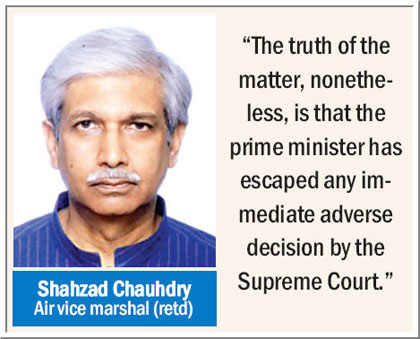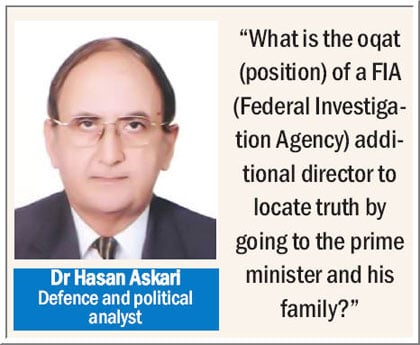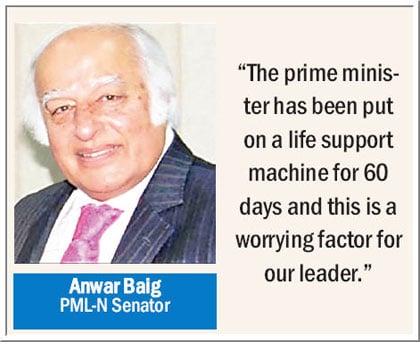INSIGHT
 The decision taken by the Supreme Court of Pakistan on the infamous Panama leaks has raised many questions amid the critics, as well as the well wishers of the country. Many now wonder if there would be a violent reaction in the coming days by those who believe the judgement was unfair, which might lead to renewed political volatility and resultant economic instability.
The decision taken by the Supreme Court of Pakistan on the infamous Panama leaks has raised many questions amid the critics, as well as the well wishers of the country. Many now wonder if there would be a violent reaction in the coming days by those who believe the judgement was unfair, which might lead to renewed political volatility and resultant economic instability.
Although the stock market index jumped further to 2000 points after the Supreme Court verdict, the uncertainty continues to haunt the economy, which is already struggling to achieve any real turnaround. The economy, particularly in the presence of increasing fiscal and trade deficits, widening current account deficit, declining both home remittances and foreign exchange reserves, is in dire straits.
The apex court’s judgment starts by quoting from the Popular 1969 novel “The Godfather” by Mario Puzo, which recounted the violent tale of a Mafia family. The author selected “Behind every great fortune there is a crime” as the fascinating epigraph of the novel.
Most of the opinion leaders, political analysts and independent economists do not think that the decision on the Panama leaks would help restore both the political and economic stability. They say that the uncertainty has stayed and were yet to go away in terms of witnessing greater economic and business activity across the country.
Air vice marshal (retd) Shahzad Chauhdry believed that the matter was not over, as the apex court has called for the setting up of a Joint Investigation Team (JIT) in seven days which should submit its report in 60 days. The element of uncertainty, therefore, was still very much there. “And this is not good for the economy, though stock market index had greatly improved after the SC verdict,” he added.
For the time being, he said, Nawaz Sharif was rescued because there was no overwhelming evidence against him to step down. The issue, he said, has been delayed to have the final outcome of the Panama papers. “But one must take into account the performance of commissions, committees and JITs etc when it comes to deciding any serious issue,” he added.
“The truth of the matter, nonetheless, is that the prime minister has escaped any immediate adverse decision by the Supreme Court,” the retired air marshal said, who believed that uncertainty would prevail unless something concrete came out of the whole process, and the economy would continue to suffer.
Another noted defence and political analyst Dr Hasan Askari said uncertainty had been removed to some extent, but required winding up of the issue. According to him, as long as the issue was present the dream of achieving economic stability would remain a tall order.
He was not sure that the truth the Supreme Court was trying to find out could be found out by a lower level JIT and asked, “What is the oqat (position) of a FIA (Federal Investigation Agency) additional director to locate truth by going to the prime minister and his family?”
 He was of the view that what the prime minister and his family’s lawyers had presented in the Supreme Court as proof, would be given to the JIT, therefore, there was no hope to locate new material to make the prime minister guilty of any crime. “Nawaz Sharif has survived, but uncertainty does not seem to be going away which is very bad for our economy and the business environment.”
He was of the view that what the prime minister and his family’s lawyers had presented in the Supreme Court as proof, would be given to the JIT, therefore, there was no hope to locate new material to make the prime minister guilty of any crime. “Nawaz Sharif has survived, but uncertainty does not seem to be going away which is very bad for our economy and the business environment.”
Pakistan Muslim League-Nawaz (PML-N) Senator Anwar Baig said the “party was not over” as the proposed JIT would investigate the issue and report back to the apex court. “My party colleagues have not understood the judgment and started celebrations before time,” he added.
“The prime minister has been put on a life support machine for 60 days and this is a worrying factor for our leader,” Senator Baig said, and added that the final judgment was still to come, therefore, there was no need to celebrate anything as it would be premature and unconvincing.
The issue, he pointed, out, has thoroughly been messed up by what he termed the “under 19 team” of the prime minister, and it would be difficult to undo. During the last 10 months, the economy of the country has suffered enormously and who knew when certainty would return.
“My main concern is the economy, which is yet to be revived, and this cannot be revived under the prevailing political instability,” he said, and added that the Supreme Court judgment has not helped in restoring the confidence of the businessmen and investors.
Seemingly, the politics of protests and violence has not made an appearance as yet, and even the worst political opponents of the PML-N have accepted the decision of the Supreme Court on the Panama leaks.
The stock market too did not react negatively, and remained relatively calm. But who knows what will happen next.
As soon as it was said that the apex court would announce its judgment on April 20 (last Thursday), the prime minister hurriedly rescheduled his political engagements and inaugurated the 717 megawatt natural gas- fired power plant at Bhikki near Sheikupura, Punjab.
 There he talked more on politics by accusing his opponents - without naming former President Asif Zardari and PTI chairman Imran Khan - of creating instability in the garb of the Panama leaks issue. The prime minister sufficiently vented his anger and said those who brought load-shedding should be ashamed and that they have no right to talk about power shortage. It was a clear insinuation against Mr Zardari.
There he talked more on politics by accusing his opponents - without naming former President Asif Zardari and PTI chairman Imran Khan - of creating instability in the garb of the Panama leaks issue. The prime minister sufficiently vented his anger and said those who brought load-shedding should be ashamed and that they have no right to talk about power shortage. It was a clear insinuation against Mr Zardari.
The younger Sharif on the occasion was perhaps too excited when he said that if judgment in Panama case was to be remembered for 20 years, Nawaz Sharif’s achievements would be remembered for 40 years- some called it a direct message to the superior judiciary to avoid giving any decision against the ruling elite.
One of the things that angered the prime minister too much was the unexpected, nearly 14-16 hours of load-shedding, ahead of the elections scheduled in 2018. Last week, he took back to back meetings to discuss the electricity shortfall which has started ranging between 7,000 to 8,500 megawatts. The shortfall has provided an opportunity to the opposition parties to make a mockery of the tall claims made by the PML-N about ending load-shedding by 2018.
The truth of the matter is that nobody in their wildest imagination believed that electricity shortfall of such a magnitude could be experienced in the summer of 2017, especially after the repeated official claims that more than 3,000MW of electricity had been added into the national grid.
The electricity demand has surged close to 21,000MW against the generation of 13,600MW, leaving behind a shortfall of close to 7,400MW. Questions need to be asked from the federal minister for water and power Khawaja Asif and his junior minister Abid Sher Ali along with other officials, including former secretary Younus Dagha, who reportedly misinformed the prime minister about the actual shortfall.
 Insiders say that close to 40 percent water shortage had been anticipated in April this year due to dams’ reaching to their dead level. People have also been intrigued as to why some of the Independent Power Producer (IPPs) plants were producing less despite the fact that furnace oil storages of oil companies were full to capacity.
Insiders say that close to 40 percent water shortage had been anticipated in April this year due to dams’ reaching to their dead level. People have also been intrigued as to why some of the Independent Power Producer (IPPs) plants were producing less despite the fact that furnace oil storages of oil companies were full to capacity.
Questions are also being asked about the unexpected load-shedding, which seems to have made an appearance at an inopportune time. It speaks volumes about the menacing circular debt with which the federal government has failed to deal with. This has also forced the IPPs to invoke sovereign guarantees. The IPPS are also refusing to run their power plants to full capacity for want of their dues, which need to be returned to them.
Load-shedding is a serious issue, and gets even graver with time when a government fails to meet its commitments on this behalf. Failing to provide electricity could force a government to leave office or worst, face a defeat in the elections. The previous PPP government experienced their nastiest defeat in 2013 election due to long hours of load-shedding, close to 20-22 hours in a day.
The same is haunting the PML-N government now, which never missed any opportunity to say that the scourge of load-shedding would be eliminated by 2018. Previously, the chief minister of Punjab and the federal and state ministers of water and power had to face embarrassment for giving false dates of the end to load-shedding.
The fact of the matter is that the energy crisis in Pakistan has become one of the most important issues which needs to be resolved as soon as possible to not only save people from long hours of the excruciating hot weather, but also to increase industrial productivity. Providing inexpensive and adequate electricity and gas supply to industries is imperative for economic growth.
Acute energy insecurity because of the growing gap between demand and supply has been causing deindustrialisation and hence the flight of capital. Over 200 small, medium and bigger textile units in Punjab have been closed over the year due to many reasons, including the energy shortages. The situation in Sindh is also very disturbing.
Successive governments had been urged by energy experts to revamp the whole energy sector in order to remove years of corruption, malpractices and wrongdoings done within various departments. The frequent change of policies has also been responsible in discouraging investors. Add corruption to it, and many investors have chosen to exit Pakistan. The foreign investors have accused the government officers of seeking money to solve day to day problems.
Shahzad Chauhdry
Air vice marshal (retd)
“The truth of the matter, nonetheless, is that the prime minister has escaped any immediate adverse decision by the Supreme Court.”
Dr Hasan Askari
Defence and political analyst
“What is the oqat (position) of a FIA (Federal Investigation Agency) additional director to locate truth by going to the prime minister and his family?”
Anwar Baig
PML-N Senator
“The prime minister has been put on a life support machine for 60 days and this is a worrying factor for our leader.”
These experts today are desperately calling for a paradigm shift in the energy policy and handling of the problems transparently. There is a consensus that challenges in the energy sector can be resolved, provided there is a political will on the part of the rulers as well as the concerned bureaucracy which is often accused of working against the interest of the country.
Experts have urged the government to explore the untapped hydro electric potential, and to focus on the renewable energy sector to address the energy shortage in Pakistan. Questions concerning the power sector cartel and the pricing formula in the energy sector have been raised time and again.
Going forward, there is a need to implement home-grown energy policies and implementing the much needed structural reforms.
The final outcome of the Panamagate scandal after 60 days is important, and so is getting rid of the power crisis, which would be crucial for the government before the country goes to polls in 2018. In case of the failure, the current government could meet the fate of PPP, which experienced the worst ever defeat due to long hours of load-shedding.
The writer is a senior journalist based in Islamabad